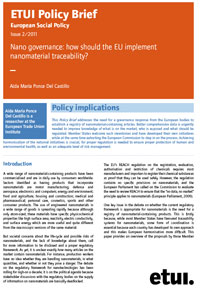| Jun 07, 2011 | |
Nanotechnology governance: how should the EU implement nanomaterial traceability? |
|
| (Nanowerk News) This Policy Brief (Nano governance: how should the EU implement nanomaterial traceability?) from the European Trade Union Institute (ETUI) addresses the need for a governance response from the European bodies to establish a registry of nanomaterial-containing articles. Better comprehensive data is urgently needed to improve knowledge of what is on the market, who is exposed and what should be regulated. Member States welcome such inventories and have developed their own initiatives but it is crucial to harmonise them in order to achieve proper protection of human and environmental health. | |
| Background | |
| A wide range of nanomaterial-containing products have been commercialised and are in daily use by consumers worldwide. Sectors identified as having products that incorporate nanomaterials are motor manufacturing; defence and aerospace; electronics and computers; energy and environment; food and agriculture; housing and construction; medical and pharmaceutical; personal care, cosmetics, sports and other consumer products. | |
 The use of engineered nanomaterials in a wide range of goods is spreading rapidly because although only atom-sized, these materials have specific physicochemical properties like high surface area, reactivity, electric conductivity, and surface energy which are more useful and quite different from the macroscopic versions of the same material. But societal concerns about the life-cycle and possible risks of nanomaterials, and the lack of knowledge about them, call for more information to be disclosed and a proper regulatory framework. As yet, it is unclear exactly how many articles on the market contain nanomaterials. For instance, production workers have no idea whether they are handling nanomaterials, in what quantities, and whether or not they pose a danger. The debate on the regulatory framework for nanotechnologies has been rolling for nigh-on a decade; it is on the political agenda because stakeholder discussions with the regulatory bodies on the supply of information on nanomaterials are basically deadlocked. The EU's REACH regulation on the registration, evaluation, authorisation and restriction of chemicals requires most manufacturers and importers to register their chemical substances as proof that they can be used safely. However, the regulation contains no specific provisions on nanomaterials, and the European Parliament has called on the Commission to evaluate the need to review REACH to ensure that the "no data, no market" principle applies to nanomaterials (European Parliament, 2009). One key issue in the debate on whether the current regulatory framework is appropriate for nanomaterials is the need for a registry of nanomaterial-containing products. This is firstly because, while most Member States have favoured traceability systems for nanomaterials, some form of coordination is essential because each country has developed its own approach and this makes European harmonisation more difficult. This paper provides an overview of the proposals by those Member States like France, Italy, the Netherlands and Belgium who have actively developed such systems. Secondly, it is doubtful whether voluntary measures will provide enough information, and they are not followed by all industries. The proposal is to establish a mandatory registry to achieve a transparent regulatory framework for nanomaterials, which would require joint efforts by national authorities and the Commission. |
| Source: European Trade Union Institute (ETUI) |
